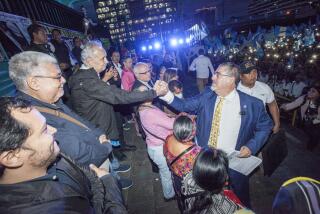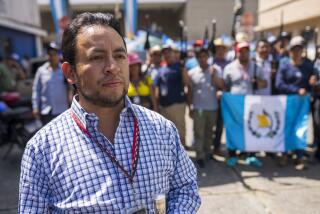Guatemala Rebels, Government Call Truce
GUATEMALA CITY — Sealing a two-way cease-fire, the most significant advance yet toward peace in Central America’s last remaining civil war, President Alvaro Arzu on Thursday personally told soldiers in strife-torn Quiche province to stop antiguerrilla operations.
Arzu had ordered a halt to counterinsurgency operations late Wednesday, hours after guerrilla commanders declared a cease-fire from their Mexico City office.
“I think it’s the end of the conflict,” said Frank La Rue, a political analyst at the Washington-based Legal Action Center for Human Rights.
The ending of hostilities is a major breakthrough in the five years of peace talks aimed at halting three decades of civil war and appears to vindicate Arzu’s decision to name a government negotiator who many military supporters grumbled was too sympathetic to the guerrillas.
The cease-fire also lends credibility to Arzu’s promise that within seven months of his January inauguration he would end the fighting that has claimed more than 150,000 lives and produced 45,000 refugees and 40,000 “disappeared.” Most of the victims have been Indian peasants, and the heaviest casualties were in Quiche--100 miles north of Guatemala City--where Arzu spoke Thursday.
“The peace is going to be signed this year, and the encouraging proof of that is the cease-fire,” he told troops at the Playa Grande military base. “We hope . . . this is the end of the fighting.”
The cease-fire also raised hopes that Guatemala will disarm the military-directed rural militias, known as civil patrols, which have regularly come under international criticism for human rights violations.
“Goodwill shown by the rebel high command allows us to foresee in a short time the demobilization of civil patrols in some parts of the country,” said Defense Minister Julio Balconi.
The communique released Wednesday by the rebels stated, “The high command wishes to give substantial support to the advance of the peace process. For that reason, it has agreed to temporarily suspend all offensive military operations.”
The rebels said they would defend themselves from army attacks and continue to collect “war taxes” from landowners in areas under their control.
The government reciprocated, making the current cessation of hostilities the first open-ended cease-fire of the war. Brief cease-fires were previously declared for elections in November and January, and for Pope John Paul II’s February visit.
Announced just days before peace negotiations resume in the Mexican capital, the cease-fire “sets the tone for the next round of talks and clearly shows consensus between both parties,” said La Rue. Issues on the agenda include socioeconomic and land reform measures.
Pending topics are civic groups and the Guatemalan military’s role in a postwar society.
More to Read
Sign up for Essential California
The most important California stories and recommendations in your inbox every morning.
You may occasionally receive promotional content from the Los Angeles Times.










